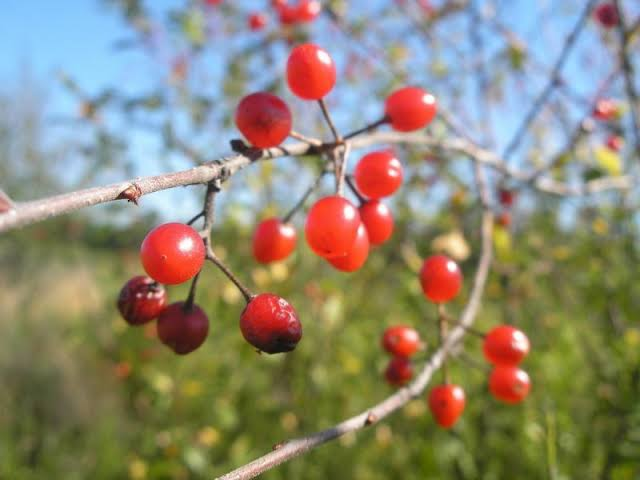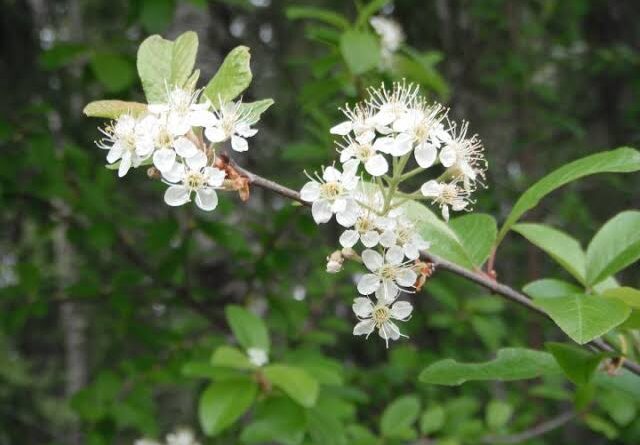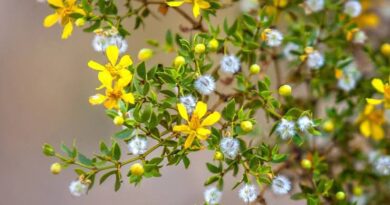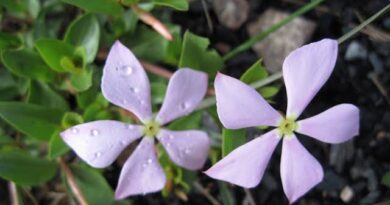17 Medicinal Health Benefits Of Prunus emarginata (Bitter Cherry)
Prunus emarginata, commonly known as Bitter Cherry, has a rich history of traditional use in herbal medicine. This article explores the various medicinal health benefits it offers and provides insights into its botanical description.
Introduction and History of Prunus emarginata:
Prunus emarginata, or Bitter Cherry, is a plant deeply intertwined with the cultural and medicinal history of indigenous communities in North America. For centuries, this plant has been revered for its diverse health benefits. Its historical significance and traditional uses make it a valuable subject of study and exploration.
The Botanical Description of Prunus emarginata
1. Life: Prunus emarginata is a deciduous shrub or small tree. It typically ranges from 2 to 20 feet in height, depending on environmental conditions. Its deciduous nature means that it sheds its leaves annually.
2. Leaves: The leaves of Prunus emarginata are alternate, simple, and elliptical in shape. They possess finely toothed margins and exhibit a deep green color.
3. Flowers: The plant produces clusters of small, white to pinkish flowers. These flowers have a distinctive aroma that can be pleasant to some and less appealing to others.
4. Fruits: The fruits of Prunus emarginata, as the common name suggests, are cherries. They are small and typically range from red to dark purple. The cherries have a bitter taste, which distinguishes them from sweet cherries, such as Prunus avium.
5. Habitat: Bitter Cherry is native to western North America and can be found in a variety of habitats, including mountainous regions, forests, and open woodlands. It is well-suited to elevations ranging from 1,000 to 10,000 feet.
6. Bark: The bark of the plant is smooth and reddish-brown. It provides another distinguishing feature for identifying Prunus emarginata.
7. Wildlife Attraction: The bitter cherries are a valuable food source for various wildlife, including birds and mammals, and they play a role in the ecosystem by attracting these creatures.
The botanical description of Prunus emarginata reveals its unique characteristics and adaptation to specific environments. These features contribute to its traditional and contemporary uses, as well as its significance in both natural ecosystems and herbal medicine.
Certainly, here’s the information you requested with the headings and explanations:
The Geographic Distribution of Prunus emarginata
1. Native Range: Prunus emarginata, commonly known as Bitter Cherry, is native to western North America. Its distribution spans from British Columbia in Canada to California in the United States. This range covers a variety of habitats, including montane forests, woodlands, and chaparral ecosystems.
2. Elevational Range: Bitter Cherry is versatile in its adaptation to different elevations. It can be found at elevations ranging from approximately 1,000 to 10,000 feet (300 to 3,000 meters) above sea level. This wide elevational range showcases its ability to thrive in diverse environmental conditions.
3. Habitat Preferences: Within its native range, Prunus emarginata thrives in a range of habitats, including mountainous regions, open woodlands, and along the edges of forests. Its adaptability to these environments makes it a common presence in western North American landscapes.
4. Role in Ecosystems: Bitter Cherry plays a crucial role in ecosystems by providing food for various wildlife species, such as birds and mammals. The cherries serve as a valuable resource for these animals and contribute to local biodiversity.
The Chemical Composition of Prunus emarginata
1. Cyanogenic Glycosides: Bitter Cherry contains cyanogenic glycosides, such as prunasin, which are responsible for its bitter taste. These compounds can release cyanide when ingested, making it important to avoid excessive consumption of the cherries.
2. Antioxidants: Like many fruits, Prunus emarginata cherries contain antioxidants, including vitamins C and E, which help combat oxidative stress and contribute to overall health.
3. Nutritional Content: Bitter Cherry cherries provide a range of essential nutrients, including carbohydrates, dietary fiber, and small amounts of vitamins and minerals. These nutritional components make them a valuable food source.
4. Phytochemicals: The plant may contain phytochemicals with potential health benefits, but further research is needed to understand the full extent of their effects.
The Harvesting and Processing of Prunus emarginata
1. Harvesting: Bitter Cherry cherries can be harvested when they reach maturity. However, it’s essential to exercise caution, as they have a bitter taste due to cyanogenic glycosides. Careful processing is necessary to reduce the bitterness.
2. Processing for Culinary Use: The cherries can be processed for culinary purposes by removing the seeds and cooking them into jams, jellies, or pies. Processing helps to make them more palatable and allows for their incorporation into various recipes.
3. Potential Medicinal Uses: In traditional and herbal medicine, Prunus emarginata has been used for its potential medicinal properties. It can be processed into infusions, tinctures, or poultices for specific health-related applications.
4. Responsible Harvesting: When harvesting and processing Bitter Cherry, it’s important to do so sustainably, avoiding overharvesting and minimizing any adverse impact on the plant’s populations and local ecosystems.
This information covers the geographic distribution of Prunus emarginata, its chemical composition, and the methods of harvesting and processing this plant, offering valuable insights into its natural habitat, nutritional content, and potential uses.
Read Also: 7 Medicinal Health Benefits Of Lythrum alatum (Winged loosestrife)
The Medicinal Health Benefits Of Prunus emarginata (Bitter Cherry)

Prunus emarginata, or Bitter Cherry, offers a diverse range of medicinal health benefits, drawing from its historical use in herbal medicine and its unique chemical composition.
1. Antioxidant Properties: Bitter Cherry contains antioxidants like vitamins C and E, which combat oxidative stress and reduce the risk of chronic diseases.
2. Digestive Health: The dietary fiber in Bitter Cherry cherries supports healthy digestion by regulating bowel movements and relieving constipation.
3. Nutrient-Rich Food Source: Bitter Cherry cherries are a valuable source of essential nutrients, including carbohydrates, dietary fiber, and vitamins.
4. Potential Immune Support: Some compounds in Bitter Cherry may boost the immune system, enhancing the body’s defenses against infections.
5. Respiratory Health: Traditional remedies have used Bitter Cherry for respiratory issues like coughs and sore throats, highlighting its potential benefits in this regard.
6. Hydration Source: In regions with water scarcity, Bitter Cherry cherries can be chewed to provide hydration.
7. Anti-Inflammatory Effects: Bitter Cherry may have anti-inflammatory properties, which can help manage conditions like arthritis and skin irritations.
8. Nutrient Absorption: Compounds in Bitter Cherry may enhance nutrient absorption in the digestive system.
9. Traditional Healing Practices: Indigenous communities have long used Bitter Cherry in their traditional healing practices for various health concerns, demonstrating its cultural significance.
10. Potential Antimicrobial Effects: Some studies suggest that Bitter Cherry has antimicrobial properties that can be beneficial for addressing infections.
11. Wound Healing: Bitter Cherry has been used as a poultice for wound healing, potentially due to its antimicrobial and astringent properties.
12. Satiety and Weight Management: The dietary fiber in Bitter Cherry contributes to a sense of fullness, which can be helpful for weight management and appetite control.
13. Cardiovascular Health: Antioxidants in Bitter Cherry reduce the risk of cardiovascular diseases.
14. Diabetes Management: Some studies indicate that Bitter Cherry may help manage diabetes by regulating blood sugar levels.
15. Antidiarrheal Properties: Bitter Cherry cherries have been used traditionally to alleviate diarrhea, highlighting their antidiarrheal potential.
16. Anti-Inflammatory Skin Care: Topical applications of Bitter Cherry may benefit skin health by reducing inflammation and soothing skin irritations.
17. Nutritional Supplementation for Livestock: In arid regions, Bitter Cherry cherries are used as nutritional supplementation for livestock, promoting the health of animals.
The Methods of Usage to Achieve the Provided Health Benefits Of Prunus emarginata (Bitter Cherry)
1. Dietary Consumption: Bitter Cherry cherries can be consumed directly, incorporated into various dishes, or processed into jams, jellies, or pies. Cooking and processing help reduce bitterness.
2. Herbal Infusions: Bitter Cherry can be prepared as herbal infusions by steeping the plant material in hot water. These infusions can be consumed to benefit from its antioxidant and digestive properties.
3. Topical Applications: For wound healing and skin issues, Bitter Cherry can be prepared into poultices or salves and applied directly to the affected area to harness its potential antimicrobial and anti-inflammatory effects.
4. Dietary Supplements: Bitter Cherry supplements are available in various forms, such as capsules or tablets, offering a convenient way to obtain its health benefits.
5. Traditional Healing: In traditional healing practices, Bitter Cherry may be used in various forms, including herbal remedies and tinctures, to address specific health concerns.
The Side Effects Of Using Prunus emarginata Medicinal Plant
1. Allergic Reactions: Some individuals may be sensitive or allergic to compounds in Bitter Cherry. If you experience allergic symptoms, such as skin rashes or itching, discontinue use and seek medical advice.
2. Gastric Discomfort: High doses of dietary fiber can lead to gastric discomfort, including stomach pain and digestive issues. It’s important to follow recommended dosage guidelines.
3. Medication Interactions: Bitter Cherry may interact with certain medications, especially those used to manage diabetes. Consult with a healthcare provider if you are on prescription drugs.
4. Not Suitable for Everyone: While Bitter Cherry has numerous health benefits, it may not be suitable for everyone. Pregnant or nursing individuals and those with specific medical conditions should consult with a healthcare provider before incorporating it into their health regimen.
This information provides a comprehensive understanding of the medicinal health benefits of Bitter Cherry (Prunus emarginata), the methods of usage to achieve these benefits, and the potential side effects and considerations for its use. It’s essential to exercise caution, especially if you have specific sensitivities or are taking other medications, and consult with a healthcare professional before incorporating Bitter Cherry into your health regimen.
Read Also: 18 Medicinal Health Benefits Of Mahonia nervosa (Longleaf Oregon Grape)
Certainly, here’s the information you requested with the headings and explanations:
The Scientific Research and Studies of Prunus emarginata (Bitter Cherry)

1. Antioxidant Studies: Scientific research has explored the antioxidant properties of Bitter Cherry, particularly its flavonoid and vitamin content. Studies aim to understand how these antioxidants combat oxidative stress and contribute to overall health.
2. Nutritional Analysis: Research has conducted comprehensive nutritional analyses of Bitter Cherry cherries, providing insights into their macronutrient and micronutrient content. These studies reveal the potential of this plant as a nutrient-rich food source.
3. Traditional Medicinal Uses: Scientific studies have investigated the traditional medicinal uses of Bitter Cherry, shedding light on its efficacy in addressing various health concerns and the compounds responsible for its therapeutic properties.
4. Digestive Health Research: Some studies have focused on the effects of Bitter Cherry on digestive health, exploring its potential benefits in regulating bowel movements and reducing the risk of digestive issues.
5. Immune System Studies: Research has examined the impact of Bitter Cherry on the immune system, aiming to establish its role in enhancing immunity and reducing the risk of infections.
6. Wound Healing Research: Scientific investigations have explored the potential wound-healing properties of Bitter Cherry, particularly its effects on inflammation and microbial activity at wound sites.
7. Diabetes Management Research: Some studies have investigated the role of Bitter Cherry in managing diabetes by regulating blood sugar levels. These studies aim to establish the effectiveness of Bitter Cherry in this context.
8. Cardiovascular Health Studies: Research has explored how Bitter Cherry antioxidants contribute to cardiovascular health by reducing the risk of heart diseases.
9. Anti-Inflammatory Properties: Scientific studies have investigated the anti-inflammatory properties of Bitter Cherry and its potential applications in addressing inflammatory conditions.
10. Antimicrobial Research: Some investigations have focused on the antimicrobial properties of Bitter Cherry, aiming to understand its effectiveness against various pathogens.
The Safety Precautions and Recommendations In Using Prunus emarginata (Bitter Cherry) Medicinal Plant
1. Allergic Reactions: Be cautious of potential allergic reactions. If you experience skin rashes, itching, or any adverse symptoms after using Bitter Cherry remedies, discontinue use and seek medical attention.
2. Gastric Discomfort: High doses of dietary fiber in Bitter Cherry can lead to gastric discomfort, including stomach pain and digestive issues. Follow recommended dosage guidelines.
3. Medication Interactions: Bitter Cherry may interact with certain medications, especially those used to manage diabetes. Consult with a healthcare provider if you are on prescription drugs.
4. Not Suitable for Everyone: While Bitter Cherry has numerous health benefits, it may not be suitable for everyone. Pregnant or nursing individuals and those with specific medical conditions should consult with a healthcare provider before incorporating it into their health regimen.
FAQs About Prunus emarginata (Bitter Cherry) Medicinal Plant
Q1: Is Bitter Cherry safe for everyone?
A1: Bitter Cherry is generally safe, but individuals with known allergies or those on specific medications should exercise caution and seek medical advice before use.
Q2: Can Bitter Cherry be used during pregnancy?
A2: Pregnant individuals should consult with a healthcare provider before using Bitter Cherry products. While it has benefits, its safety during pregnancy is not well-established.
Q3: What is the best way to use Bitter Cherry for its medicinal properties?
A3: Bitter Cherry can be used in various forms, including dietary consumption and herbal infusions. The choice depends on your specific health needs and preferences.
Q4: Are there any known side effects of using Bitter Cherry?
A4: Some individuals may experience side effects, including allergic reactions, gastric discomfort, or interactions with medications. Monitoring for adverse reactions is recommended.
Q5: Can I find Bitter Cherry products in stores, or do I need to prepare them at home?
A5: Bitter Cherry products, such as dietary supplements, may be available in some stores. You can also prepare herbal remedies at home using the plant material, ensuring they are sourced from reputable sources.
This information covers the scientific research and studies related to Bitter Cherry (Prunus emarginata), safety precautions and recommendations for its use, and answers to frequently asked questions about this medicinal plant, providing readers with valuable insights into its potential benefits and considerations for use.
Read Also: Recommended Ways for Disposing Textile Wastes









